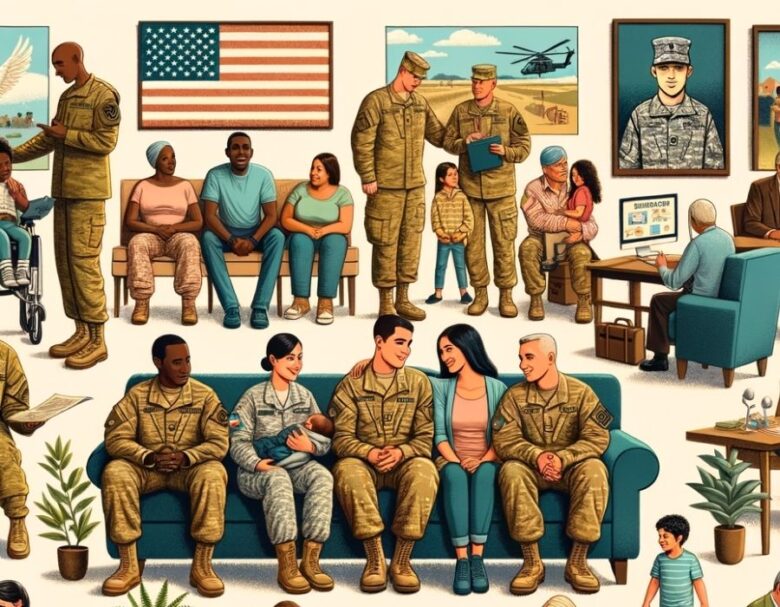The transition from military to civilian life is a journey that impacts not just the service member, but the entire family. This comprehensive guide explores the various programs and services available to support military families during this significant life change, ensuring a smoother transition for everyone involved.
Understanding the Impact of Transition on Families
Military families face unique challenges during the transition process, including:
- Relocation and housing changes
- Shifts in family dynamics
- Financial adjustments
- Educational transitions for children
- Healthcare changes
- Employment challenges for spouses
Recognizing these challenges is the first step in addressing them effectively.
Department of Defense (DoD) Transition Assistance Program (TAP)
The TAP is a mandatory program for service members, but it also offers valuable resources for families.
Key TAP Components for Families:
- Military OneSource: Offers a wide range of support services
- Spouse Transition and Readiness Seminars (STARS): Tailored for military spouses
- Financial Planning Workshops: Help families prepare for civilian financial realities
- Relocation Assistance: Supports families in finding new housing and schools
Tip: Encourage family members to participate in TAP sessions whenever possible.
Military OneSource: A Comprehensive Resource
Military OneSource is a free service provided by the DoD to support service members and their families.
Services Offered by Military OneSource:
- Non-medical counseling
- Financial counseling
- Education and employment resources
- Relocation and deployment tools
- Child care resources
- Health and wellness coaching
Military OneSource services are available for up to 365 days after separation or retirement.
Family Readiness Groups (FRGs)
FRGs are command-sponsored organizations that provide support and assistance to military families.
FRG Support During Transition:
- Information dissemination
- Mutual support
- Referral services
- Volunteer opportunities
- Community involvement
While traditionally focused on deployment support, many FRGs also assist with transition-related issues.
Educational Support for Military Children
Changing schools can be one of the most challenging aspects of transition for military children.
Educational Support Programs:
- Interstate Compact on Educational Opportunity for Military Children: Ensures smooth school transitions
- School Liaison Officers: Assist with school-related issues
- Tutor.com: Offers free online tutoring for military children
- Military Child Education Coalition: Provides resources and support
Tip: Start planning for educational transitions as early as possible.
Employment Resources for Military Spouses
Military spouses often face unique employment challenges during transition.
Spouse Employment Programs:
| Program | Description |
|---|---|
| Military Spouse Employment Partnership (MSEP) | Connects spouses with employers committed to hiring military spouses |
| Spouse Education and Career Opportunities (SECO) | Provides career coaching and education support |
| MyCAA Scholarship | Offers up to $4,000 in tuition assistance for eligible military spouses |
| USO Pathfinder | Transition services including employment support for spouses |
Remember: Many of these programs are available for a period after separation or retirement.
VA Benefits for Families
The Department of Veterans Affairs offers several benefits that extend to family members.
Key VA Family Benefits:
- Post-9/11 GI Bill Transfer: Allows service members to transfer educational benefits to spouses or children
- VA Caregiver Support Program: Provides resources for family caregivers
- Civilian Health and Medical Program (CHAMPVA): Health care for eligible dependents and survivors
- VA-Guaranteed Home Loans: Can be used by veterans and surviving spouses
Eligibility for these benefits may vary based on the service member’s status and length of service.
Mental Health Support for Families
The transition process can be emotionally challenging for all family members.
Mental Health Resources:
- Military Family Life Counselors (MFLCs)
- Vet Center family counseling services
- TRICARE mental health coverage
- Give an Hour (free mental health services)
- Military OneSource non-medical counseling
Encourage all family members to seek support if they’re struggling with the transition.
Financial Planning and Support
Financial readiness is crucial for a successful transition to civilian life.
Financial Resources for Families:
- Personal Financial Management Program: Offered on military installations
- Financial counseling through Military OneSource
- Transition Compensation: Temporary financial assistance during transition
- Savings Deposit Program (SDP): Helps build savings before transition
Consider meeting with a financial advisor who specializes in military transitions.
Housing Assistance
Finding new housing is often a key concern for transitioning families.
Housing Support Programs:
- Basic Allowance for Housing (BAH) during transition
- VA Home Loan Guarantee Program
- Housing counseling services
- Temporary lodging expense reimbursement
Start researching housing options in your desired location well before transition.
Community Integration Support
Connecting with the civilian community is an important part of the transition process.
Community Integration Resources:
- USO Pathfinder Program: Helps connect families with their new communities
- American Red Cross Services to Armed Forces: Offers various support services
- Veterans Service Organizations (VSOs): Many have family support programs
- Local community centers and libraries: Often offer programs for new residents
Tip: Volunteer work can be a great way to integrate into a new community.
Continued Support Post-Transition
Many support services remain available even after the official transition period.
Post-Transition Support Options:
- Veteran Service Organizations (VSOs)
- State Veterans Affairs offices
- Vet Centers
- Nonprofit organizations focused on veteran families
Stay connected with these resources even after you feel settled in civilian life.
Frequently Asked Questions
Q: How long do we have access to military support services after separation? A: It varies by program. Many services, like Military OneSource, are available for up to a year after separation. Others, like certain VA benefits, may be lifelong.
Q: Can my child continue to use DoD schools after we transition? A: Generally, DoD schools are for active duty families. However, there may be exceptions in certain circumstances. Check with your School Liaison Officer for specific guidance.
Q: Are there support groups for children of transitioning service members? A: Yes, organizations like the Military Child Education Coalition offer various programs and support groups for military children, including those going through transition.
Q: How can I help my spouse find employment in our new location? A: Utilize resources like the Military Spouse Employment Partnership, state workforce agencies, and local veteran service organizations. Many offer job search assistance and career counseling.
Q: What should we do if we’re struggling financially during the transition? A: Reach out to Military OneSource for financial counseling, contact your local VA office for information on available benefits, and consider reaching out to veteran-focused nonprofits that offer financial assistance.
Conclusion
The transition from military to civilian life is a significant journey for the entire family. While it comes with its challenges, numerous programs and services are available to support military families through this process. By taking advantage of these resources, families can navigate the transition more smoothly and set themselves up for success in their new civilian lives.
Remember that every family’s transition experience is unique. What works for one family may not work for another, so it’s important to explore different resources and find what best suits your family’s needs. Don’t hesitate to reach out for help – these programs and services exist to support you and your family during this important life change.
As you move forward, keep in mind that the strength, resilience, and adaptability your family developed during military service are valuable assets in civilian life. The skills you’ve honed as a military family – flexibility, teamwork, and perseverance – will serve you well as you embark on this new chapter together.
Embrace this transition as an opportunity for growth and new experiences. With the right support and resources, your family can thrive in civilian life, building on the strong foundation you established during your military service. Remember, you’re not just transitioning out of the military – you’re transitioning into a new set of opportunities and experiences as a family.




